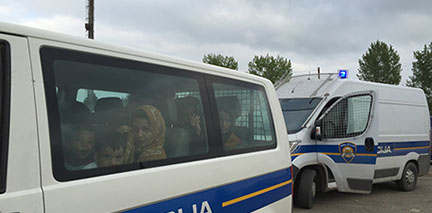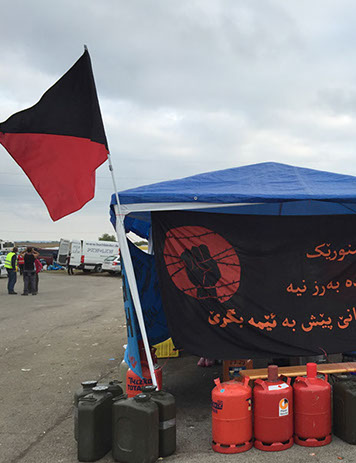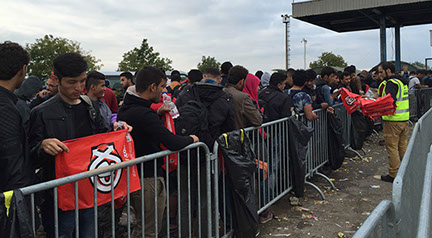Territories of Blood
"We are all refugees." With this statement, a Croatian volunteer who had to leave her home during the war in former Yugoslavia summarizes her reasons to help migrants
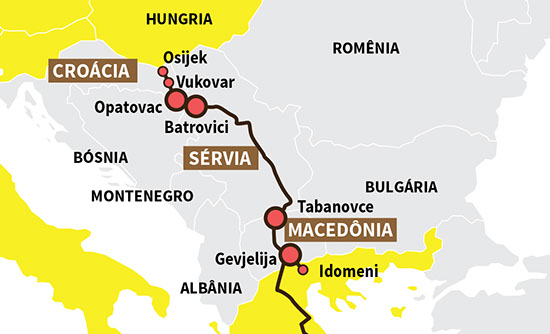
On Friday morning, September 25, I get a ride with Croatian volunteers to the refugee camp at Opatovac. After an unsuccessful attempt to link up with the group on the Hungarian border the night before, I keep looking for Ghazi's family. Renata, a 31-year-old, blue-eyed brunette, drives the car. The owner of a pet hotel and an event planner, Renata decided to raise donations for the migrants on her own initiative, with the help of her friends. Until now, they have been known for animal rights' activism. Facing an ever-increasing number of refugees, they decided they had to do something more.
Renata began writing posts on Facebook, asking for clothing and food donations. And she was surprised by the controversy that her initiative sparked on the social website. Although friends have contributed to the campaign, it was the ferocity of the critics that stunned her.
“Many people say that these Muslims are invading Europe with their mosques, that they are going to destroy our churches, that we already have our own problems, and people who need help in our own country," says Renata (who deleted the comments), disgusted.
Voluntárias croatas distribuem donativos no campo de Opatovac
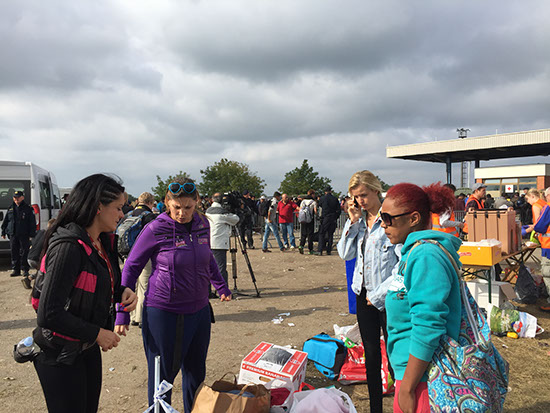
Her friend Sonja Domic, 32, says they are both atheists and don't care about the migrants' religion. They just want to help.
“What is truly unbelievable is that many of these people who are criticizing us right now were the same ones who used to complain that we only cared about animals and not people. Now that we want to help people, they say these folks are not worthy of help,” she protests.
Pages such as “Refugees Not Welcome” abound on Facebook, where critics can voice their hatred towards migrants. All kinds of arguments can be found in the posts: from photo montages of refugees with weapons to accuse them of terrorism, to pictures of migrants dropping donated blankets along the way. The page “Refugees Not Welcome” had 1,017 likes until that Thursday, as well as different versions in several countries.
Before hitting the road from Osijek — the largest city in that region — to the refugee camp, her two friends pack the trunk with donations. They pick up two more volunteers and head to the Opatovac camp with several bags of clothes and bottles of mineral water. It will be a 50-minute drive. On the way, we pass through Vukovar, one of the cities that were destroyed during the war between Croatian forces and Serbian separatists in the early 1990s, after independence from Yugoslavia. Sonja, who used to live in the city, recalls that she had to flee with her family, never to return.
“I am also a refugee. I left all my toys in my old house,” she remembers.
Fluxo de migrantes, que passa de 51 mil pessoas, põe governo croata em alerta
With memories of a recent war still lingering on her mind, Sonja feels like she's traveling back in time when she sees images of bombed Syrian cities. To this day, she is scared of sirens and gunfire. Another friend traveling in the back seat of the car, Ana Laura Kapetanovic, a slender blonde who works as a model for fashion brands, says she also had to leave home to escape war, moving to Slovenia at the time.
“This is the reason why I'm doing this right now. We are all refugees,” she explains.
After arriving at the camp, I unsuccessfully look for clues that might lead me to Ghazi's family. It seems they are no longer there. Red Cross volunteers say there is no such thing as a database with all the names. Since there are so many people coming in, it would take several days to process all the personal data.
"I'd love to help, but we don't have any information," a volunteer says.
Outside the camp, the Croatian Prime Minister gives information to the press. The police order the volunteers to move their tents away from where the donations are placed. The reason given is that it disrupts the lines. Resentfully, volunteers begin moving their tents away.
”How are we supposed to help people when we have to stay far from them?” they ask.
On the radio, we hear that over 51,000 refugees have arrived in Croatia. There is an apprehensive mood as the authorities maintain there is not enough room for so many people.
“They're not trying to stay here, they just want to pass through,” Sonja argues.
Early the next afternoon, I get a message from Mohamed, the Iraqi traveling with the family, telling where the group is. He shares his GPS location with me via WhatsApp. They are now in Salzburg, in western Austria.
The refugees are always looking for wi-fi spots to catch up onthe news. So much so that wall sockets are among the most sought-after items of the trip: the refugees need them to recharge their cellphones. It is no coincidence that the Vienna train station, where I take the train to meet the group in Salzburg, has a special wi-fi connection for refugees, named "refugee-information".
